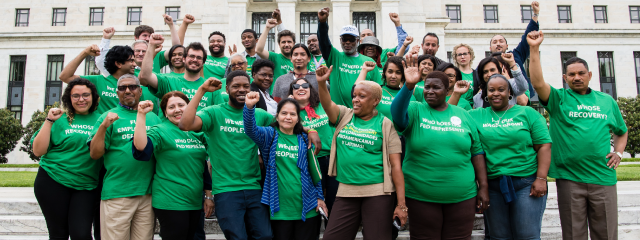Show Us Your Budget, And We’ll Tell You Who You Are

Trump’s budget is the best indication we have of his priorities as president. And it should come as no surprise that he wants to bolster his deportation forces and spend billions on a racist, needless wall and even more on crony defense contractors, while cutting the programs and investments that people in this country need to live healthy and stable lives.
The Center for Popular Democracy believes that we can --and must-- invest in policy priorities that are premised on respect and commitment to community dignity. We believe that when we invest in the resources that we all need to thrive -- like health care, housing, and education -- we build safe and viable neighborhoods. These are the priorities of the people in this country and should be reflected in the budget.
We’ve contrasted Trump’s vision with ours. It’s possible to build a federal budget to provide for all people in this country, whether white, Black or Brown. We need a budget that invests in the resources that help our communities thrive, instead of Trump’s budget cuts and wasteful spending on a xenophobic and racist agenda.
Criminal Justice and Immigrant Detention
Trump's budget allocates additional billions of dollars towards immigration detention and deportation, and pass-through grants to local and state police departments which fuel mass criminalization and mass incarceration.
The budget increases funding by almost 20 percent for the deportation forces of ICE and Border Patrol. It represents a continued commitment to over-policing, mass criminalization and mass incarceration.
Our federal dollars should be used to advance public safety through an investment in the health and well-being of communities, including in substance abuse, mental health, youth services, housing, education and neighborhood infrastructure.
Public Health
Trump wants to worsen our public health crises by cutting Medicare spending by $845 billion over the next 10 years, cutting SNAP by $17.2 billion just this year, and slashing federal health spending.
Trump went against his commitment to ending the HIV/AIDS epidemic and curtailing the opioid epidemic with these budgetary proposals. Instead of putting the resources into a single-payer health system that would cover all people in this country, he has chosen to leave our sick to flounder.
If we are going to take on public health crises like the opioid epidemic and decrease the rate of uninsured in this country, we need new funding sources. The CARE Act and Medicare for All help to make our country healthy. Cuts to medical and nutritional services do anything but.
Housing
The budget would cut the Department of Housing and Urban Development’s budget by 14 percent, or $6.8 billion dollars.
Because of the cuts, the poorest tenants in publicly-subsidized rental housing would face soaring rents. The federal government would walk back on its commitment to construct and maintain housing in both rural and urban communities. People across the country face an affordable housing crisis that this budget would worsen.
We need deep investments in public and affordable housing and programs that support struggling families, increased and expanded tenant protections, including rent control, just cause evictions and right to counsel, and the regulation of predatory corporate landlords.
Census and Democracy
Trump’s budget jeopardizes a fair U.S. Census count, requesting $7.2 billion for the entire Census when stakeholders estimate that it would cost at least $8 billion to carry out 2020 Census activities in FY 2020 alone.
Trump's budget drastically underfunded the Census and signals the lack of administration support for a fair and accurate count — one that counts all communities equally well.
When everyone is counted in the Census, our government and civil society can make sure that we all have the protections and resources that we need to thrive. We need accurate demographic counts of all our communities, regardless of how we look, where we live, or what our immigration status.
Labor and Workforce Protections
Trump’s budget cuts the Department of Labor by nearly 10 percent, which cuts into lifelines like unemployment insurance.
While the federal government has not increased the minimum wage in 10 yrs, this projected debt load will lead to slower income growth and less opportunities for workers. This sham proposal comes in the context of a draconian budget that calls for deep cuts to programs that millions of families rely on.
Instead, Trump could fully fund a paid family leave policy that ensures coverage for all workers instead of excluding 75% of those who take time to care for family members with their own serious injuries or health. The only remedy is real, comprehensive paid family medical leave policy - one that is sustainably funded (not at the expense of already depleted UI) and reflects the true needs of American workers.
Education
Trump proposed a $7.1 billion cut to the education budget, though it asks for a $60 million increase in funding for charter schools. It also increases funding for “school safety measures” that increase militarization and hardening of schools.
In response, Education Secretary Betsy DeVos said that the budget is fundamentally about “education freedom.” This statement demonstrates the administration’s adherence to an education privatization agenda. To talk about the education budget as being fundamentally about "education freedom" circumvents the fact that education should be about equity and high quality. It also ignores the growing movement by teachers and parents calling to an end to charter expansion and renewed investment in teachers and public schools.
We envision a flourishing system of public education where all students can learn and grow. Fully-funded public schools give all students the opportunity to thrive. Instead of school surveillance technology that make students of color feel less safe in the classroom, we need investment in guidance counselors, restorative justice practices, and mental and emotional health services.












